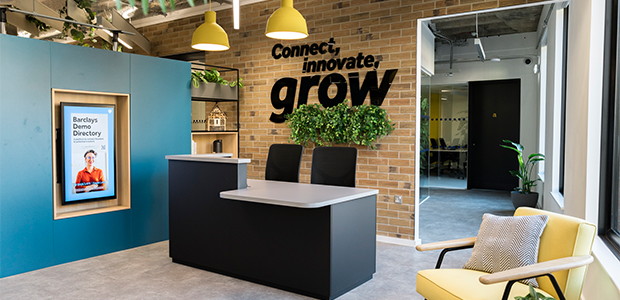
Barclays relaunches Cambridge coworking space for climatetech startups
Barclays recently unveiled its revamped Cambridge Eagle Lab, refocusing its efforts on supporting rapidly growing climate tech startups. The lab's extensive renovation aims to slash its carbon emissions by 90% relative to 2018 levels.
The redesigned facility now boasts the capacity to accommodate up to 130 individuals and offers a 75% expansion in collaborative space. This allows for more versatile arrangements for meetings, events, and networking. A special section is dedicated to displaying climate tech innovations and businesses that Barclays backs through its initiatives like Unreasonable Impact ventures, Bridge programmes, and Sustainable Impact Capital investments.
Barclays is in a unique position to aid clients in achieving net zero and is committed to investing in vital climate tech. This is crucial for society's transition, promoting economic growth, and fostering new green job opportunities. This relaunch comes on the heels of Barclays' recent collaboration with Carbon 13, a venture builder based in Cambridge, which aims to support over 100 startups with guidance and mentorship to confront global challenges on the journey to net zero.
The lab serves as a hub of excellence for climate tech. The International Energy Agency has estimated that 35% of the emission reductions required by 2050 will stem from technologies not yet on the market. Therefore, support for emerging businesses is essential. Climate tech enterprises can engage in several Barclays-run pre-seed and bridge programmes, alongside top industry partners:
- Carbon 13 Venture Launchpad: a 20-week virtual initiative helping pre-seed and early-stage businesses develop scalable solutions to climate-related challenges.
- Bridge programmes: A series of programmes, in partnership with Codebase, linking corporations with startups for knowledge and strategic exchange:
- Sustainability Bridge Programme: Government-funded (as part of the Digital Growth Grant) with a focus on sustainable transport.
- Energy Transition Programme: Funded by Opportunity North East, concentrating on innovation aiding the Energy Transition.
- Rise Startup Academy: a 10-week digital-first programme equipping early-stage founders with essential market-ready skills and tools. A dedicated Climate FinTech edition is set to launch later this year.
As part of its net zero by 2050 goal, the Cambridge Eagle Lab has undergone significant retrofitting to enhance energy efficiency. This was executed in collaboration with firms from Barclays' Sustainable Impact Capital portfolio and Unreasonable Impact programme, such as Save Money Cut Carbon, who provided consultancy on the retrofitting plans.
Achieving net zero involves adopting low-carbon solutions in key sectors like electricity, transport, and heating. The building's upgrades include:
- Solar panels from Naked Energy, a hybrid technology generating both heat and power, offering higher energy density than alternative solar technologies.
- Energy-efficient double-glazed windows with solar control, plus roof and cavity wall insulation, and water reduction technologies.
- A smart heating, ventilation, and air conditioning system, powered by renewable energy sources on-site, for better temperature control.
- Automated lighting and window-blind controls, enhancing light quality and reducing energy consumption.
Nick Stace, Head of Sustainability, Barclays UK, said: “We’re excited to be reopening the doors to our Eagle Lab in Cambridge with a renewed focus as a centre of excellence for climate tech start-ups. We want to play a leading role in supporting climate tech and sustainability-focused businesses, by giving them the tools to help them connect, grow and scale. It was crucial that the retrofit and internal redesign of the building accurately reflected the ethos of the businesses that will use it and we expect it to provide significant energy efficiency improvements, allowing us to take an important step forward in reducing our own operational emissions.
“We know that startups need more than just a space, which is why we’re also supporting businesses through our climate tech accelerator programmes from the Cambridge Eagle Lab. We hope this package of support enables businesses to scale at pace and tackle some of today’s most pressing climate tech challenges.”

